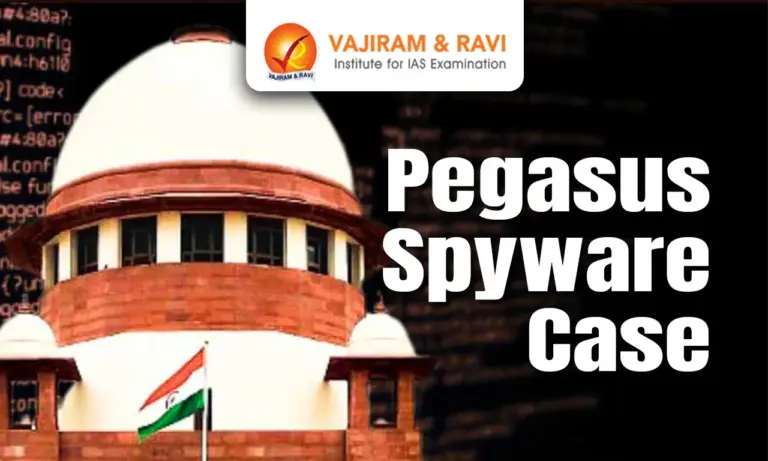What’s in Today’s Article?
- Pegasus Spyware Case Latest News
- Spyware
- SC Emphasizes National Security Over Disclosure
- Pegasus Spyware Case FAQs
Pegasus Spyware Case Latest News
- The Supreme Court, while hearing the Pegasus case, said there is no issue with a country having spyware for national security, but the real concern is its use against individuals, which will be examined.
Spyware
- Spyware is a type of malicious software (malware) designed to secretly gather data from a user’s device and transmit it to third parties without consent.
- It is often used for financial gain by advertisers, data brokers, or cybercriminals.
Purpose and Risks
- Spyware collects sensitive information like browsing history, financial details, and login credentials.
- It poses serious threats by:
- Enabling identity theft and financial fraud
- Slowing device and network performance
- Causing data breaches in businesses
- Installing additional malicious software
Common Types of Spyware
- Adware – Monitors activity to serve or sell targeted ads.
- Infostealer – Gathers specific data and chat logs.
- Keyloggers – Records every keystroke to steal usernames, passwords, and messages.
- Rootkits – Grants deep access to a system, often undetectable.
- Red Shell – Tracks user activity during PC game installations.
- System Monitors – Captures emails, websites visited, and keystrokes.
- Tracking Cookies – Follows user behavior across the web.
- Trojan Horse Virus – Delivers spyware by disguising as legitimate software.
How Spyware Works: The 3-Step Process
- Infiltration – Installed via apps, malicious websites, or attachments.
- Monitoring and Data Capture – Tracks browsing, captures keystrokes, and takes screenshots.
- Transmission or Sale – Sends stolen data to attackers or sells it on the dark web.
Impact
- Spyware compromises personal and business data, facilitates identity theft, and weakens cybersecurity defenses.
- Detecting and removing spyware can be challenging due to its stealthy nature.
SC Emphasizes National Security Over Disclosure
- The Supreme Court stated that national security cannot be compromised, and there is nothing wrong with a country possessing or using spyware for security purposes.
- The bench, led by Justice Surya Kant and Justice N Kotiswar Singh, clarified that the key concern is not ownership of spyware but against whom it is deployed.
Individual Right to Privacy Recognised
- While declining to make the full report public, the Court acknowledged that individuals have a Constitutionally protected right to privacy.
- It stated that people who suspect their phones were hacked deserve to know the truth, and the court would consider informing them individually.
Petitions Alleging Government Surveillance
- The case stems from petitions filed in 2021 by journalists, activists, and public figures.
- They alleged that the government used Pegasus spyware, a military-grade surveillance tool made by Israel’s NSO Group, to monitor citizens.
- Petitioners argued that the core issue remains whether the government possesses and has used Pegasus.
- They stressed that ownership implies the potential for continued surveillance.
Justice R V Raveendran Committee Report: No Public Disclosure
- On demands to release the report of the SC-appointed Justice R V Raveendran committee, the bench refused, citing national security and sovereignty concerns.
- In October 2021, the Supreme Court appointed a technical committee to investigate whether individuals’ phones were hacked using Pegasus spyware.
- The committee was supervised by Justice (retd) R.V. Raveendran, and in 2022, it submitted its findings to the court in a sealed cover.
- In August 2022, the Supreme Court noted the committee had found no conclusive evidence of Pegasus spyware use in the phones examined.
- Malware was detected in five devices, but its nature could not be definitively linked to Pegasus.
- The Centre did not cooperate with the investigation, as per the report.
- SC remarked that while individuals can be informed if their phones were targeted, the report cannot become a public debate document.
Pegasus Spyware Case FAQs
Q1. What did the Supreme Court say about spyware in the Pegasus case?
Ans. The SC said owning spyware is acceptable for national security but emphasized concern over misuse against individuals.
Q2. What is spyware and how does it work?
Ans. Spyware secretly collects data from devices through infiltration, monitoring, and transmits it to unauthorized third parties.
Q3. What did the Justice R V Raveendran committee report conclude?
Ans. The committee found no clear Pegasus use; malware existed in five devices but was not conclusively linked to Pegasus.
Q4. Why won’t the Pegasus report be made public?
Ans. The Supreme Court cited national security and sovereignty risks as reasons for not disclosing the committee’s full report.
Q5. What are the privacy implications in the Pegasus case?
Ans. The SC acknowledged privacy as a fundamental right and may individually inform those whose phones were potentially compromised.
Last updated on February, 2026
→ UPSC Notification 2026 is now out on the official website at upsconline.nic.in.
→ UPSC IFoS Notification 2026 is now out on the official website at upsconline.nic.in.
→ UPSC Calendar 2026 has been released.
→ UPSC Final Result 2025 is expected to be released in the first week of March 2026.
→ Check out the latest UPSC Syllabus 2026 here.
→ Join Vajiram & Ravi’s Interview Guidance Programme for expert help to crack your final UPSC stage.
→ UPSC Mains Result 2025 is now out.
→ UPSC Prelims 2026 will be conducted on 24th May, 2026 & UPSC Mains 2026 will be conducted on 21st August 2026.
→ The UPSC Selection Process is of 3 stages-Prelims, Mains and Interview.
→ Prepare effectively with Vajiram & Ravi’s UPSC Prelims Test Series 2026 featuring full-length mock tests, detailed solutions, and performance analysis.
→ Enroll in Vajiram & Ravi’s UPSC Mains Test Series 2026 for structured answer writing practice, expert evaluation, and exam-oriented feedback.
→ Join Vajiram & Ravi’s Best UPSC Mentorship Program for personalized guidance, strategy planning, and one-to-one support from experienced mentors.
→ Check UPSC Marksheet 2024 Here.
→ UPSC Toppers List 2024 is released now. Shakti Dubey is UPSC AIR 1 2024 Topper.
→ Also check Best UPSC Coaching in India


















